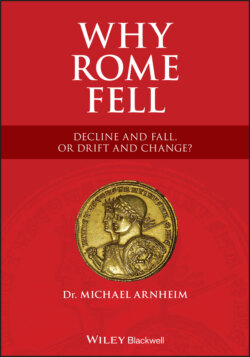Читать книгу Why Rome Fell - Michael Arnheim - Страница 59
The Imperial Cult
ОглавлениеFrom the beginning of the Principate, there was always a tendency to revere the emperor in a religious sense. Though Augustus steadfastly refused divine honors for himself, he turned the deification of his adoptive father, Julius Caesar, to good account, styling himself divi filius (son of a god). Requests from the Greek-speaking provinces of Asia and Bithynia as early as 30 BCE to worship the future Augustus as sōter (savior) were deflected by combining this worship with that of Dea Roma (the personification of Rome as a goddess). (Cassius Dio, 51.20.6–7.) The loyalty of Roman citizens living in the provinces was to be demonstrated by worship not of the living ruler but of Dea Roma and Divus Julius. (Suetonius, Divus Augustus, 52; Tacitus, Annals, 4.37.)
The title Augustus, meaning “the sublime one,” initially used as a name, was redolent of divinity, associated as it was with Romulus, the eponymous mythical founder of Rome, who was worshiped as a god under the name of Quirinus. With a few exceptions, emperors were routinely deified upon death. Vespasian’s deathbed joke, cited in the previous chapter, “Dear me, I think I’m becoming a god,” represents a skeptical attitude towards imperial deification coupled with a recognition of it as a normal feature of Roman religion.
Sacrificial offerings were believed to propitiate the gods, and deified emperors were honored in the same way as the more established gods. The great majority of the population of the Roman Empire were not offended by the imperial cult. In the Eastern areas, particularly, there was a long tradition of worshiping even living rulers, going back well beyond their incorporation into the Roman Empire. So, the imperial cult formed a natural and integral part of the state religion.
In the West, and particularly in Italy, to avoid worshiping the living emperor, the emperor’s genius was worshiped instead. Every Roman paterfamilias (head of the family) was believed to have his own genius, which was not the same thing as his soul, but rather was his attendant spirit. As all genii were divine, they were a proper object of worship, sidestepping the worship of a living person.
But the worship even of dead emperors was anathema to both Jews and Christians, who abhorred it as the worship of a graven image or idolatry, categorically prohibited in the Ten Commandments. It is sometimes suggested that the Jews were given special exemption from participation in the imperial cult. This does not appear to be correct, but Jews were certainly dispensed from the sacrificial duties associated with the cult, being allowed to substitute for it prayers for the emperor’s well-being instead. (See Momigliano 1987.) The Jews could be recognized as a separate nation and so could normally enjoy the same toleration for their religion as was normally accorded by the Roman state religion to other communal religions. (See below.) But Christians did not form any distinct national, communal, or social element within the Empire. As far as the Roman authorities were concerned, Christians were simply members of Roman society, and their refusal to participate in the imperial cult, an integral part of the Roman state religion, could be regarded as seditious. So, the persecution of Christianity, a much rarer occurrence than is commonly believed (see below), was not motivated by any disagreement over doctrine, creed, or belief but was purely political.
